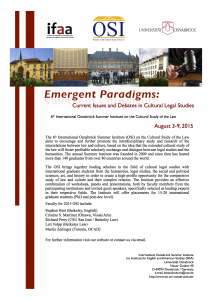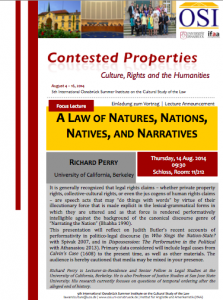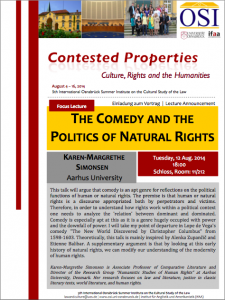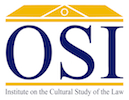Mar
04
2015

OSI
 We are happy to announce that the sixth International Osnabrueck Summer Institute on the Cultural Study of the Law will be held from August 3 to 9, 2015 at the University of Osnabrueck, Germany. It aims to encourage and further promote the interdisciplinary study and research of the interrelations between law and culture, based on the idea that the extended cultural study of the law will foster profitable scholarly exchange and dialogue between legal studies and the humanities.
We are happy to announce that the sixth International Osnabrueck Summer Institute on the Cultural Study of the Law will be held from August 3 to 9, 2015 at the University of Osnabrueck, Germany. It aims to encourage and further promote the interdisciplinary study and research of the interrelations between law and culture, based on the idea that the extended cultural study of the law will foster profitable scholarly exchange and dialogue between legal studies and the humanities.
The Institute will offer a combination of thematic workshop sessions, small group seminars and a final symposium for 15-20 international participants (doctoral, post-doctoral and advanced M.A. – see below for eligibility). The introductory workshop will address the range and potential of interdisciplinary studies and approaches in field of law and the humanities. The remaining thematic sessions and small group seminars will focus on key issues and debates in current cultural legal studies, for example:
- The tripartite relationship between culture, cultural rights, and the nation state
- The historical emergence of dominant (legal) concepts of property as well as current struggles about culture as heritage, property and resource for creativity (including concepts such as copyright, intellectual property and authorship)
- The cultural presence and representation of the law and the role of culture in the representation and dissemination of the concept of rights (e.g. law and literature, life writing and human rights, visual culture and rights rhetoric)
The main objective of the Institute is the encouragement of scholarly exchange across disciplines and the critical debate of current research projects and work in progress. Participants will have the opportunity to present and discuss their own work both within the larger group and in individual sessions with members of the OSI faculty.
Faculty for the 2015 OSI include:
- Stephen Best (Berkeley, English)
- Cristina S. Martinez (Ottawa, Visual Arts)
- Richard Perry (CSU San José / Berkeley Law)
- Leti Volpp (Berkeley Law)
- Martin Zeilinger (Toronto, OCAD)
In addition, the OSI will feature a professional workshop presenting and discussing scholarship and grant opportunities for young international researchers sponsored by the EU and the German Academic Exchange Service.
You can download the announcement poster here.
We will post more information and the program of the 2015 OSI soon. To stay tuned subscribe to our mailing list, like us on Facebook or subscribe to our RSS feed.
Dec
08
2014

OSI
 We have another call for papers to share, this time for the 7th annual workshop of the International Society for the History and Theory of Intellectual Property (ISHTIP), which will take place from Joly 22-24, 2015 at the University of Pennsylvania. They seek a broad representation of international scholars as well as scholars from across the disciplines. Papers may concern trademark, patent, copyright, or related rights, including confidentiality and trade secrecy, and they may be historical or address current issues from a theoretically-informed perspective. Both established and junior scholars are encouraged to submit abstracts. The deadline for application is January 15, 2015.
We have another call for papers to share, this time for the 7th annual workshop of the International Society for the History and Theory of Intellectual Property (ISHTIP), which will take place from Joly 22-24, 2015 at the University of Pennsylvania. They seek a broad representation of international scholars as well as scholars from across the disciplines. Papers may concern trademark, patent, copyright, or related rights, including confidentiality and trade secrecy, and they may be historical or address current issues from a theoretically-informed perspective. Both established and junior scholars are encouraged to submit abstracts. The deadline for application is January 15, 2015.
We think this workshop may be of interest to many OSI alumni. You can find more information at http://www.ishtip.org/ and in the official Call for PapersISHTIP CFP final .
Oct
13
2014

OSI
Our colleague Greta Olson asked us to share this Call for Papers with you and we are more than happy to do so. The theme of the conference “Law’s Pluralities – Cultures:Narratives:Images:Genders” should be of interest to anyone working in Law and Humanities. The conference will take place next year, from 6-8 May 2015, at the Justus Liebig University Giessen in Germany. Please click here for more details and the call for papers.
Aug
12
2014

OSI
 As the last contributor to our lecture series of this year’s Osnabrück Summer Institute on the Cultural Study of the Law, we are happy to announce Richard Perry. Prof. Perry will speak on “A Law of Natures, Nations, Nativs, and Narratives” on Thursday, 14 August 2014, at 9.30 am in room 11/212. Richard Perry is Lecturer-in-Residence and Senior Fellow in Legal Studies at the University of California, Berkeley. He is also Professor of Justice Studies at San Jose State University. His research currently focuses on questions of temporal ordering after the alleged end of history.
As the last contributor to our lecture series of this year’s Osnabrück Summer Institute on the Cultural Study of the Law, we are happy to announce Richard Perry. Prof. Perry will speak on “A Law of Natures, Nations, Nativs, and Narratives” on Thursday, 14 August 2014, at 9.30 am in room 11/212. Richard Perry is Lecturer-in-Residence and Senior Fellow in Legal Studies at the University of California, Berkeley. He is also Professor of Justice Studies at San Jose State University. His research currently focuses on questions of temporal ordering after the alleged end of history.
Abstract:
It is generally recognized that legal rights claims – whether private property rights, collective-cultural rights, or even the jus cogens of human rights claims – are speech acts that may “do things with words” by virtue of their illocutionary force that is made explicit in the lexical-grammatical forms in which they are uttered and as that force is rendered performatively intelligible against the background of the canonical discourse genre of “Narrating the Nation” (Bhabha 1990).
This presentation will reflect on Judith Butler’s recent accounts of performativity in politico-legal discourse (in Who Sings the Nation-State? with Spivak 2007, and in Dispossession: The Performative in the Political with Athanasiou 2013). Primary data considered will include legal cases from Calvin’s Case (1608) to the present time, as well as other materials. The audience is hereby cautioned that media may be mixed in your presence.
Aug
09
2014

OSI
 We are happy to announce our next focus lecture within the context of this year’s Osnabrück Summer Institute on the Cultural Study of the Law. Prof. Karen-Margrethe Simonsen will talk about “The Comedy and the Politics of Natural Rights” on Tuesday, 12 August 2014, at 6 pm in room 11/212.
We are happy to announce our next focus lecture within the context of this year’s Osnabrück Summer Institute on the Cultural Study of the Law. Prof. Karen-Margrethe Simonsen will talk about “The Comedy and the Politics of Natural Rights” on Tuesday, 12 August 2014, at 6 pm in room 11/212.
Karen-Margrethe Simonsen is Associate Professor of Comparative Literature and Director of the Research Group “Humanistic Studies of Human Rights” at Aarhus University, Denmark. Her research focuses on law and literature, justice in classic literary texts, world literature, and human rights.
Abstract: This talk will argue that comedy is an apt genre for reflections on the political functions of human or natural rights. The premise is that human or natural rights is a discourse appropriated both by perpetrators and victims. Therefore, in order to understand how rights work within a political context one needs to analyze the ‘relation’ between dominant and dominated. Comedy is especially apt at this as it is a genre hugely occupied with power and the downfall of power. I will take my point of departure in Lope de Vega’s comedy “The New World Discovered by Christopher Columbus” from 1598-1603. Theoretically, this talk is mainly inspired by Alenka Zupančič and Etienne Balibar. A supplementary argument is that by looking at this early history of natural rights, we can modify our understanding of the modernity of human rights.
 We are happy to announce that the sixth International Osnabrueck Summer Institute on the Cultural Study of the Law will be held from August 3 to 9, 2015 at the University of Osnabrueck, Germany. It aims to encourage and further promote the interdisciplinary study and research of the interrelations between law and culture, based on the idea that the extended cultural study of the law will foster profitable scholarly exchange and dialogue between legal studies and the humanities.
We are happy to announce that the sixth International Osnabrueck Summer Institute on the Cultural Study of the Law will be held from August 3 to 9, 2015 at the University of Osnabrueck, Germany. It aims to encourage and further promote the interdisciplinary study and research of the interrelations between law and culture, based on the idea that the extended cultural study of the law will foster profitable scholarly exchange and dialogue between legal studies and the humanities.




